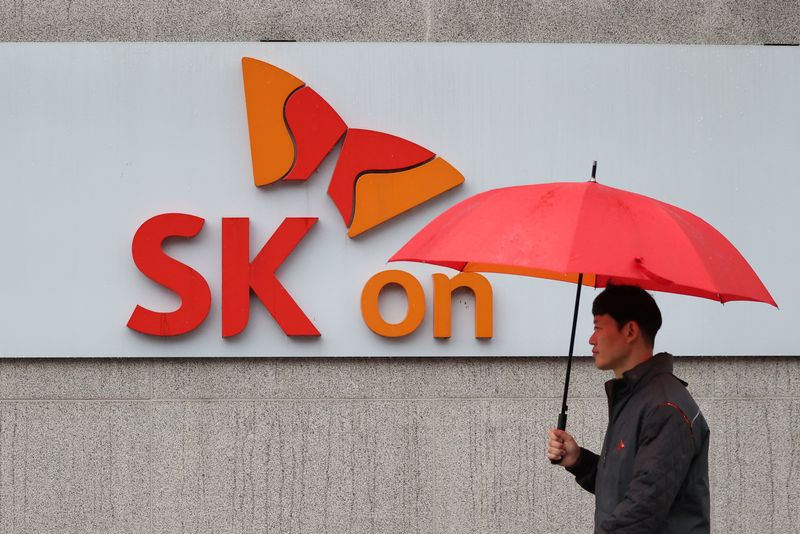By Heekyong Yang
SEOUL (Reuters) – South Korean EV battery maker SK On is in talks with automakers to supply prismatic batteries, expanding on its existing bag-type batteries, a senior executive said, as it races to turnaround amid slowing global electric vehicle (EV) demand.
SK On, part of the energy group SK Innovation, which supplies EV batteries to Ford Motor (NYSE:), Hyundai Motor (OTC:), Volkswagen (ETR:), among others, is speaking to several car manufacturers that want to draw up prismatic models deals for the supply of batteries, said SK On chief spokesperson Ko Chang-Kook.
“We are in discussions with car manufacturers who want to use our prismatic batteries… we will now have the opportunity to diversify our product portfolios sooner or later,” Ko told Reuters.
Ko did not reveal the names of automakers, but said the company has already completed prismatic battery technology and is ready to start producing prismatic batteries once discussions are completed.
There are three types of lithium-ion batteries currently used in electric cars: prismatic, cylindrical and pouch type. These are all fundamentally the same in terms of functionality, but each has pros and cons.
Prismatic and cylindrical batteries are encased in hard materials. Bag types use sealed flexible films and are protected by thin metal bags. SK On currently only produces pocket batteries for electric vehicles.
While the company secured prismatic battery technology, it also wants to develop cylindrical batteries, commonly known for the type used by Tesla (NASDAQ:).
Asked whether SK On, which has never made a profit since it was spun off from SK Innovation at the end of 2021, plans to cut its capital expenditure for the year, Ko said SK On is not thinking about that for now. research and development expenditure.
Earlier this year, SK On’s parent company SK Innovation said it had an investment budget of about 9 trillion won ($6.55 billion) for this year, of which more than 80% was allocated to SK On.
City rival LG Energy Solution (LGES) said in April that it plans to minimize capital expenditure this year due to declining demand for electric vehicles. Last month, LGES halted part of the construction of its multibillion-dollar battery factory in the US state of Arizona, as LGES can flexibly adjust the pace of planned investment execution to optimize its operations.
In April, SK On said it was still on track to break even in the second half of this year. The company said this month it would implement across-the-board cost cuts, including freezing the salaries of all executives until the company turns a profit.
SK Innovation is expected to pursue a merger with profitable gas affiliate SK E&S to help support SK On, local media have reported.

On Friday, SK Innovation said in a regulatory filing that it would hold a board meeting next Wednesday to discuss various strategic measures including mergers to strengthen its competitive position, but nothing has been decided yet.
($1 = 1,374,4200 won)


